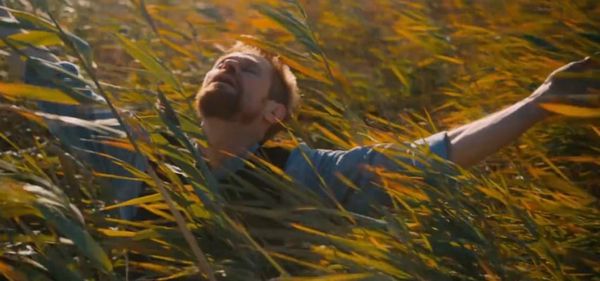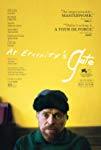Eye For Film >> Movies >> At Eternity's Gate (2018) Film Review
At Eternity's Gate
Reviewed by: Jennie Kermode

There's a scene towards the end of At Eternity's Gate in which Vincent Van Gogh (Willem Dafoe) remarks to a priest that it's possible God made him to create paintings for people not yet born. Julian Schnabel's immersive portrait of the troubled artist, which has attracted only a fraction of the attention it deserves, may be a film created in the same mould.
Dafoe's performance has won him multiple Best Actor award nominations, including one from the Oscars, and deservedly so. He fully inhabits the artist, though as Van Gogh allows, there can be no single true interpretation, just communication of the world as each individual artist sees it. It helps that his mixed European ancestry makes the physical transformation easy, this being a film in which appearances matter a great deal. The first thing that really strikes the tutored viewer, however, is the way that he has learned to move a paintbrush to create strokes that beautifully mirror Van Gogh's own, like a skilled forger, and to do so with the same confidence and at the same remarkable speed that the man himself did. This, perhaps, provided him with a way into this complex individual.

There have been many portrayals of Van Gogh onscreen, most notably in Vincent And Theo, most recently in Loving Vincent. Part of what makes Dafoe's interpretation so successful is his outright refusal to present him as a madman. There are hints of vision and of absorption in the divine that recall his work in The Last Temptation Of Christ but in other regards he is just a man who happens to be afflicted by an illness, a sensitive man whose perception becomes distorted under stress and who sometimes has blackouts during which, he is told, he does things that seem quite out of character. The film touches on these episodes only lightly, keeping its focus on the man who has to live with them.
What is most startling and compelling about this film, Dafoe's work aside, its its production design, its cinematography and Schnabel's direction. Some of the dialogue is drawn from Van Gogh's own letters; as we watch, we are moving through landscapes that will be familiar to everyone who loves the artist's work, here are they glimpsing one of his paintings perfectly framed yet alive (a technique that recalls some of Peter Greenaway's more ambitious work). We see characters who are instantly recognisable from their portraits - Emmanuelle Seigner is transformed into a perfect Madame Ginoux - and the attention to detail throughout all this is breathtaking, from reconstructed costumes right down to the stains on the plaster in the background.
The effect is enhanced by an approach to lighting that painstakingly recaptures the world as the artist saw it, from the blue-greys of Paris streets to the brilliant yellows and olive greens of Arles. Carefully chosen lenses distort our view, picking out the whorls of dead sunflowers, the drawn-out streaks of the long grass, the busy blue of a lavender field. The camera bounces as the artist runs, rattles up stony embankments, bounces along in carriages. One can easily understand why this was too much for some critics, who reportedly fled from screenings. No doubt it will be too much for some members of the public too - but for those who know and love Van Gogh's work, the effect is hypnotic, a translation of his vision into a new medium. Then there is the moment when, of an instant, everything switches into black and white, and we see a work in progress framed before its subject; a group of trees which come alive in the picture in a whole new way, revealing the insight in a comment about sculpting with paint made by Gaugin.
Gaugin is played here by Oscar Isaac, who is used sparingly yet effortlessly puts across the charisma and strong sense of self that explains Van Gogh's fixation on him - this drifting painter, carried by the wind, in need of somebody to cling to. Gaugin, of course, has his own destiny, and cannot sacrifice it to be an anchor for another; and therein lies the tragedy. Meanwhile Theo (Rupert Friend) loves his brother but has a wife and children in Paris whom he must put first. In the absence of a loved one there is only the care provided by doctors who, though kindly, struggle to understand the artist's obsession with his work.
Though there is still a story here for strangers to the subject, to see it that way is to miss out on the magic. At least take the time to look at a book of Van Gogh's paintings first. Don't be prepared for easy viewing because this was never an easy story. This is, of necessity, a demanding film, and you must give yourself up to it, allow yourself to be blinded by the light.
Reviewed on: 16 Feb 2019
















